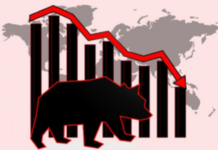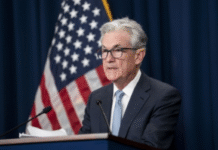Mumbai– Foreign fund outflows along with subdued global cues dragged India’s key equity indices — S&P BSE Sensex and NSE Nifty50 — lower on Thursday.
The FIIs sold Rs 1,637.46 crore on the BSE, the NSE and the MSEI in the capital market segment during the day’s trade.
Initially, the market opened with a down gap and continued to fall. Globally, Asian markets traded lower following the inflation scare related fall in the US but recovered a bit from morning lows.
The US inflation surged to a 31-year high at 6.2 per cent, following which the US dollar surged to a 16-month high and the US Treasury Yields leapt by the most since February to nearly 1.6 per cent.
Besides, European stocks were little changed on Thursday after concerns about US inflation spike offset some relief around property developer China Ever Grande and a slew of corporate earnings.
On the domestic front, volumes on the NSE were below recent average.
In terms of sectors, the consumer durable index rose the most whereas realty, banks, telecom and healthcare indices fell the most.
Consequently, the 30-scrip Sensex closed at 59,919.69 points, down 433.13 points or 0.72 per cent from its previous close.
Similarly, the NSE Nifty50 ended the day’s trade on a lower note, falling to 17,873.60 points, down by 143.60 points or 0.80 per cent from its previous close.
“Nifty picked pace on the downside after two days of small erosion,” said Deepak Jasani, Head of Retail Research, HDFC Securities.
“Negative advance decline ratio and low volumes suggest disinterest by most participants to increase their long positions. 17,757 remains a crucial support level on the downside. 17,971 on the upside could offer resistance.”
According to Siddhartha Khemka, Head – Retail Research, Motilal Oswal Financial Services: “Going ahead, market is likely to continue with its consolidation given weak global cues, persistent FII selling and last leg of earnings season. Investors would now await clues from US Fed as to how soon it would start hiking interest rates.”
“Otherwise the domestic macro trends continue to be encouraging while active Covid cases continue its declining path. Thus long term investors should buy into this correction in staggered manner while traders should follow stock specific action.”
In addition, Vinod Nair, Head of Research at Geojit Financial Services said: “Global inflationary pressure following upsetting US inflation data forced the domestic market to trade with deep cuts. Beating the market estimates, US inflation hit a 30-year high level of 6.2 per cent YoY adding fears of an earlier than expected rate hike, while US bond yields shot higher.”
“Rising inflationary pressure along with prospects of an early rate hike can keep the domestic market on edge as such indicators tempt foreign investors to pump out liquidity from emerging markets like India.” (IANS)








